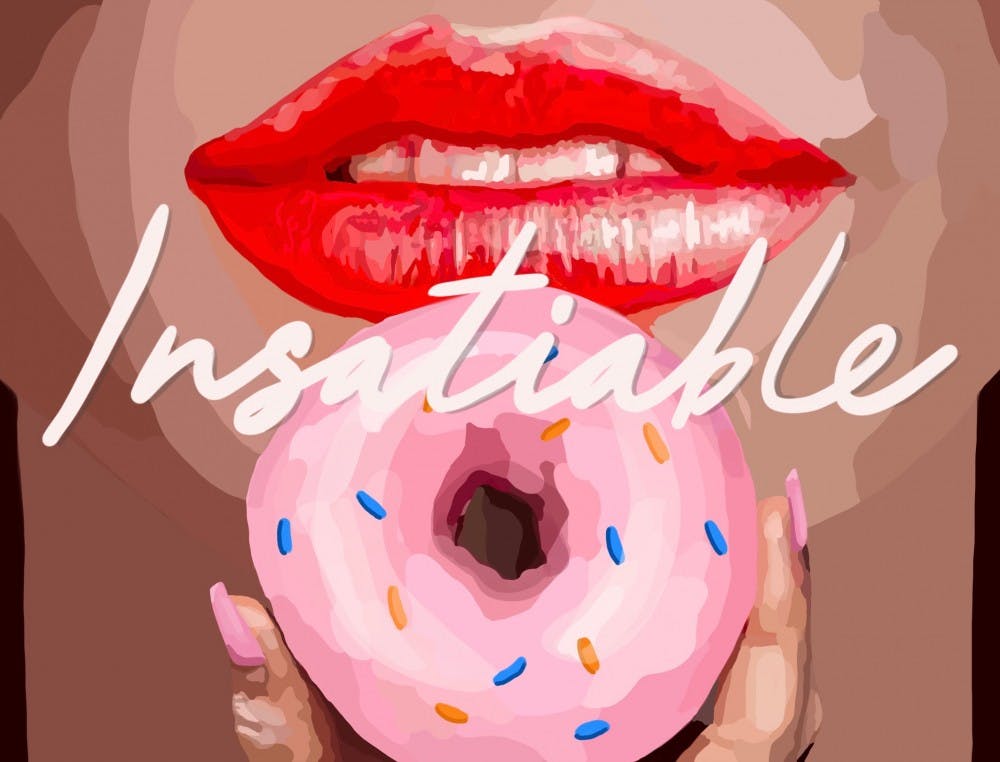There were petitions calling for the cancellation of Netflix’s Insatiable before the show was even released. After watching the trailer for the first season back in 2018, a number of outraged viewers felt Insatiable was unbelievably problematic. Having attracted criticism for homophobia, fatphobia, and racism, it seemed unlikely that Insatiable would ever survive its initial release. Now, over a year later, the show’s second season made it Netflix’s most binge–watched program on the internet.
Nothing about Insatiable is that great, but is it really that bad?
The show itself follows Patty Bledell (Debby Ryan), struggling to find happiness amid constantly getting bullied for her weight. The first episode features a downtrodden Debby Ryan gallivanting around in a fat suit, a plot point which was (understandably) not well–received. After an incident that leads to accidental weight loss, Patty—often called “Fatty Patty” by her peers in her small southern town—is transformed from a sad outcast to a vengeful beauty queen. On the face of it, the plot is tired, trope–y, and uninspired. But Insatiable takes several drastic turns and, by the end of the pilot, is already in an unexpected place.
The first season of the show primarily focuses on the relationship between Patty and her pageant coach, Bob Armstrong. Bob is an effete, well–to–do family man who’s fallen on hard times. But Bob thinks Patty could change all that. The two team up almost immediately, fueled by the belief that they saved each other from other much more tragic fates. It’s as sweet as it is bizarre how the two lean on each other. Beauty pageants serve, really, as an externalization of Bob and Patty’s tumultuous inner struggles.
From the show’s earliest moments, Patty bemoans her inner emptiness. She watches Drew Barrymore movies and eats cool whip by the tub, snarling in a raspy voice, “For as long as I can remember, I’ve been hungry. Insatiable, really.” And by the end of the first episode, Bob’s convinced her that pageants are the antidote to that hunger. But, obviously, they’re not. Within the show, pageants are basically an exercise in superficiality and southern sanctimony with campy names like “Miss Magic Jesus.” There’s no salvation there—that’s kind of the point. These two emotionally desolate characters will do anything to win in an attempt to satiate themselves. And that’s what Insatiable is about—the misdeeds and semi–felonious acts Patty and Bob are willing to commit in order to secure the crown, to dispel just a little of their internal dissatisfaction.
The show doesn’t deal with things delicately. The jokes are slapstick, the fatphobia is blatant, and the casual homophobia towards some characters is rampant. But Insatiable doesn’t punch down—the butt of their jokes are always the fatphobes and the homophobes. It’s an active criticism of bigotry. There are, of course, times when the jokes don't land quite right, or intentions are unclear. Those moments don’t seem ill–intentioned though. They seem like the show is still struggling to find its comedic footing, to figure out the point it's even trying to make.
Insatiable was panned by critics and loved by audiences. That discrepancy makes sense. Getting lost in the fluster of the show’s overwhelming plot, audiences didn’t ask the question the critics did: where is this going?
And with the release of Insatiable’s second season, we’ve finally got some answers.
The second season of the show is undoubtedly better than the first. It’s sharper, the character arcs are clearer, and, by the end of the season, the show’s direction becomes clear. This season works pretty hard to clear up some of the first season’s confusions and insensitive jokes. It’s not heavy–handed, though, and some of the season’s best comedic beats are the result of the way these corrections play out.
This season packs a much harder punch than the last. Focusing in on Patty’s problems with food and Bob’s strained relationship with his father, we finally get concrete character arcs and clear motivations. By the end of this season, Patty Bledell finally makes sense. Even better (or worse, depending on how you look at it), you kind of want to root for her.
Superficially, initial criticisms of the show are still present—Patty is still a fat girl who became skinny, stereotypes and tropes are still played up for cheap laughs. But within the context of the show, those aspects bolster the characters, making their stories more interesting. And even if you disagree with that reading, Insatiable’s messaging is pretty positive in spite of those surface issues. The satirical slant of the show refuses to let anyone off the hook—Patty is selfish, Bob is neurotic, the fatphobes are childish, and the homophobes are bigoted. There’s a lot to hate about Insatiable, but there’s a lot to like, too.
This weird, campy, bizarre romp into the bible belt has heart. And at the end of the day, the show tries, and often succeeds, in saying the right thing. So, no, it’s not really that bad. At least, not anymore.

